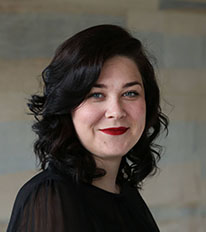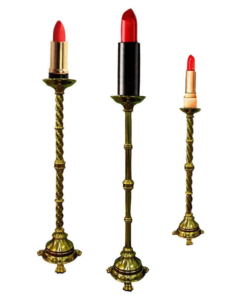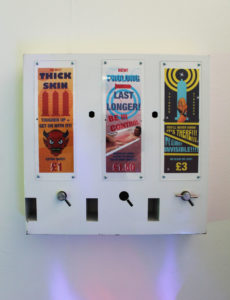
BA (Hons) Fine Art
Welcome to the BA (Hons) Fine Art programme.
This dynamic studio-centred course will provide you with generous space and fantastic contact time with practicing artists and academics. Via integrated approaches to practice and theory, you will learn to develop a confident and independent sense of enquiry in relation to contemporary fine art and practice-led research.
The lecturing team is focused on developing you artistically, technically and holistically, in other words, as an all-round fine art practitioner.
Interested? Book your place on an Open day or get in touch with University Centre Colchester to arrange an individual visit.
Course IntroductionModulesEntry RequirementsGraduate CareersAdditional
Your profile
You are an inquisitive, creative, critical and practical thinker. You have a desire to engage in the ever-expanding field of contemporary fine art practice and enjoy making work in and out of a studio environment that affords the free development of your ideas.
Your subject
Contemporary art practice is a broad and ever-evolving field and is an integral part of our culture. It involves making art that relates to the world you live in and requires the development and application of a wide range of attributes, including practical skills, aesthetic and ethical understanding, and an awareness of the way cultural, social and political contexts have a bearing on how your work is produced and experienced.
The BA (Hons) Fine Art at University Centre Colchester is a studio and workshop-based programme that will provide you with generous space and the support of expert tutors and practicing artists, to establish a confident and independent enquiry in contemporary fine art practice.
Innovative tutoring provides an integrated approach between art practice and theory, allowing you genuine opportunities for critical thinking and creative ownership of your progress.
This course is driven by independent enquiry, structured and supportive exposure, self-motivated practice and focused creative thought. Painting, printmaking and sculptural concerns are energised by drawing, lens and time based processes and imaginative use of media/materials supported by a critical theoretical framework.
Delivery is through a combination of lectures, seminars, tutorials, demonstrations, theoretical and practical investigation, studio and workshop practice, exhibitions and field trips, and self-directed study. Students will investigate exhibiting and curation of work in a range of public settings and explore the interaction of audiences with their practices.
Undergraduate courses operate on a modular basis that provides flexibility and choice. Each module is worth a specified number of credits, with most modules counting for 20 or 40 academic credits (depending on the programme), with each credit taken equating to a total amount of study time which includes scheduled teaching, independent study and assessment activity.
Most full-time students will take modules worth 60 credits per semester, with part-time students taking proportionately fewer credits per semester. A total of 120 credits per level and 360 credits are needed for an honours degree as a whole. Overall grades for the course and degree classification are based on the marks obtained for modules taken at levels 5 and 6.
Our teaching is informed by research, professional practice and industry engagement and modules change periodically to reflect developments in the discipline.
Portfolio of artwork supported by 64 UCAS points gained from study on Foundation Diploma in Art and Design or level 3 Diploma in an art related subject along with 5 GCSEs (grades A*-C) including English language, or an Art and Design Foundation Year. Exceptionally, A Level applicants with appropriate portfolio of artwork and knowledge. Students without formal qualifications but with appropriate portfolio of artwork/work experience. All applicants are formally interviewed.
*UCAS Tariff points where shown, are for entry on to higher education programmes starting from September 2024.
International applicants
If English is not your first language you will need an IELTS score of 6.0, with a minimum score of 5.5 in each component (Reading, Writing, Listening and Speaking), or an equivalent English Language qualification.
Additional requirements for International Students:
- You must provide evidence of having been in general education for at least 10 years and of having studied within the last five years
- a face-to-face or video call interview is required before an offer is made
The creative industries generate £87.4bn a year for the UK economy, representing the third largest employment sector. It is currently the largest source of job growth, contributing one in every nine new jobs.
Your future
As your course progresses, you will increasingly research and explore possibilities for future professional work opportunities and roles in the creative industries or further, postgraduate study. You will graduate as a confident and knowledgeable individual, aware of how your practice contributes to the critical debate in your chosen field. Recent graduates have gone onto exhibit work at FREE RANGE in London, Europe’s largest graduate showcase, while others have gained gallery representation, exhibiting at Manchester Contemporary Art Fair, established their own artist-led projects (such as Art4U), or joined one of the many studio-based artist communities in the area, such as Cuckoo Farm, SPACE and Mother Studios. As a graduate, you can also progress onto teacher training or extend your research interests through other postgraduate level programmes in Fine Art or Contemporary Art Practice at institutions throughout the UK.
The holistic and flexible nature of the BA [Hons] in Fine Art course will enable you to engage independently and professionally as an artist practitioner within that sector. The course will provide you with opportunities to network and experience professional practice environments, with a module in the third year, Professional Development Planning, that is tailored to proactively researching and moving towards your chosen career path such as, community arts; multimedia production; gallery and museum work; art therapy; MA research and independent studio practice.
Course Progression
An MA in Art specialisms, or an MA in Arts Management or Administration. The educational sector can be accessed through a Professional Graduate Certificate in Education.
Timetables: Timetables are normally available one month before registration. Please note that while we make every effort to ensure that timetables are as student-friendly as possible, scheduled teaching can take place on any day of the week. Part-time classes are normally scheduled on one or two days per week.
Teaching and Learning: You are taught through a combination of lectures, seminars and practical sessions in workshops and studios. Seminars enable smaller group discussions to develop understanding of topics covered in lectures.
When not attending lectures, seminars, workshop, studio or other timetabled sessions you will be expected to continue learning independently through self-study. Typically, this will involve conducting practical research as well as reading journal articles and books, working on individual or group projects, preparing coursework assignments and presentations, as well as preparing your portfolio of work to submit for assessment.
Assessment: The course provides you with opportunities to test your understanding of the subject informally before your work is formally assessed. Each module normally contains elements of developmental ‘formative’ assessment for which you receive feedback from your tutor.
There is a formal or ‘summative’ assessment at the end of each module. Assessment methods include a range of coursework assessments such as essays, reports, portfolios, presentations and your final year major project. The grades from formal assessments count towards your module mark.
Feedback: You will receive feedback on all practice assessments and on formal assessments undertaken by coursework. Feedback is intended to help you learn and you are encouraged to discuss it with your module tutor.
Disclaimer
All Fees and prices shown on the website are for courses starting in the 2024-25 academic year and are correct at the time of entering/printing information, however these may be subject to change. The College cannot accept legal or financial liability as a result of any such changes.
The course information describes programmes offered by University Centre Colchester at Colchester Institute. The College takes all reasonable steps to provide courses as described, but cannot guarantee provision. The information is for guidance and does not form any part of a contract.
The College reserves the right to update and amend information as and when necessary. University Centre Colchester at Colchester Institute will do its best to provide the courses shown, but may have to modify or withdraw a course depending on customer demand and other factors.
















































